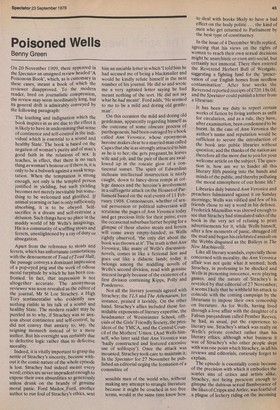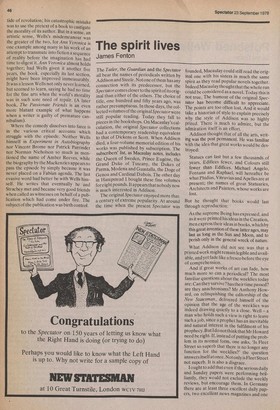Poisoned Wells
Benny Green
On 20 November 1909, there appeared in the Spectator an unsigned review headed 'A Poisonous Book', which, as is customary in these cases, meant a book of which the reviewer disapproved. To the modern reader, bred on journalistic compression, the review may seem inordinately long, but its general drift is admirably conveyed by the following paragraph: The loathing and indignation which the book inspires in us are due to the effect it is likely to have in undermining that sense of continence and self-control in the individual which is essential to a sound and healthy State. The book is based on the negation of woman's purity and of man's good faith in the relations of sex. It teaches, in effect, that there is no such thing as woman's honour or if there is, it is only to be a bulwark against a weak temptation. When the temptation is strong enough, not only is the tempted person justified in yielding, but such yielding becomes not merely inevitable but something to be welcomed and glorified. If animal yearning or lust is only sufficiently absorbing, it is to be obeyed. Selfsacrifice is a dream and self-restraint a delusion. Such things have no place in the muddy world of Mr Wells's imaginings. His is a community of scuffling stoats and ferrets, unenlightened by a ray of duty or abnegation.
Apart from the reference to stoats and ferrets, which has unfortunate connotations with the denouement of Toad of Toad Hall; the passage conveys a dominant impression of a pop-eyed prig and the work of odious moral turpitude by which he has been confronted. In fact, that impression is not altogether accurate. The anonymous reviewer was soon revealed as the editor of the journal, Mr St Loe Strachey, a High Tory sentimentalist who evidently saw nothing risible in his talk of a sound and healthy State. The modern reader may be puzzled as to why, if Strachey was so anxious about continence and self-control, he did not convey that anxiety to, say, the reigning monarch instead of to a mere author. But his oversight was certainly due to defective logic rather than to defective morality.
Indeed, it is vitally important to grasp the nettle of Strachey's sincerity, because without it the comic nature of the whole episode is lost. Strachey had indeed meant every word; critics are never imprudent enough to expose their own absurdities so generously unless drunk on the brandy of genuine moral panic. Ford Madox„Ford, another author to run foul of Strachey's ethics, sent him an amiable letter in which'! told him he had accused me of being a blackmailer and would he kindly refute himself in the next number of his journal. He did so and wrote me a very agitated letter saying he had meant nothing of the sort. He did not say what he had meant'. Ford adds, 'He seemed to me to be a mild and doting old gentleman'.
On this occasion the mild and doting old gentleman, apparently regarding himself as the outcome of some obscure process of parthogenesis, had been outraged by a book called Ann Veronica, whose eponymous heroine makes clear to a married man called Capes that she is as strongly attracted to him as he is to her; she gets pregnant, he leaves wife and job, and the pair of them are swallowed up in the roseate glow of a continental sunset. The spirit of Edwardian inchoate intellectual insurrection is nicely caught, down to fancy-dress romps at college dances and the heroine's involvement in a suffragette attack on the Houses of Parliameni based on the real events of 11 February 1908. Connoisseurs, whether of sexual perversion or political subversion will scrutinise the pages of Ann Veronica today and get precious little for their pains; even the occasional suburban furrier hoping for a glimpse of those elusive stoats and ferrets will come away empty-handed; as Wells rightly observed, The only dirt about the book was thrown at it'. The truth is thatAnn Veronica, like many of Wells's discussionnovels, comes in like a fictional lion and goes out like a didactic lamb; today it belongs among the middling novels of Wells's second division, read with genuine interest largely because of the existence of a first division containing Kipps, Polly and Ponderevo.
Not all the literary journals agreed with Strachey; the TLS and The Athenaeum, for instance, praised it lavishly. On the other hand, Strachey's allies included those formidable exponents of literary expertise, the headmaster of Westminster School, officials of the Girls' Friendly Society, the president of the YMCA, and the Central Council of the Mothers' Union. (And Wells himself, who later said that Ann Veronica was 'badly constructed and featured excessive use of soliloquy'). Once the attack was mounted, Strachey took care to maintain it. In the Spectator for 27 November he published an editorial urging the formation of a committee of sensible men of the world who, without making any attempt to strangle literature because it might be couched in too free terms, would at the same time know how to deal with books likely to have a bad effect on the body politic. . the kind of men who get returned to Parliament by the best type of constituency.
In the issue of 4 December Wells replied, agreeing that his views on the rights of women to reach their own sexual decisions might be anarchistic or even anti-social, but certainly not immoral. There then entered the Reverend Herbert Bull of Westgate, suggesting a fighting fund for the 'preservation of our English homes from needless contamination'. After four weeks the Reverend reported receipts of £720.18s.0d, and the Spectator could publish a letter from a librarian: It has been my duty to report certain works of fiction by living authors as unfit for circulation, and as a rule, they have, after examination, been condemned to be burnt. In the case of Ann Veronica the author's name and reputation would be sufficient to secure the introduction of the book into public libraries without question; and the thanks of the nation are therefore all the more due to you for your welcome article on the subject. The question is, how are we to hinder all this literary filth passing into the hands and minds of the public, and thereby polluting the moral atmosphere of our home life?
Libraries duly banned Ann Veronica and preachers fulminated against it on Sunday mornings; Wells was vilified and few of his friends chose to say a word in his defence. Frederick Macmillan was shrewd enough to see that Strachey had stimulated sales of the book in the very act of refusing to print advertisements for it, while Wells himself, after a few moments of panic, shrugged off the mud and began his celebrated assault on the Webbs disguised as the Baileys in The New Machiavelli.
Like all literary scandals, especially those concerned with morality, the Ann Veronica affair was not quite *hat it seemed; both Strachey, in professing to be shocked and Wells in protesting innocence, were playing games, and the nature of Strachey's is revealed by that editorial of 27 November; it seems likely that he withheld his attack to coincide with the coming campaign by the librarians to impose their own censorship on literature. As for Wells, having lived through a love affair with the daughter of a Fabian panjandrum called Pember Reeves, he had, as usual, put the experience to • literary use. Strachey's attack was really on 'Wells's private conduct rather than his literary ethics, although what business it was of Strachey's who other people slept with was one point which Strachey, in all his reviews and editorials, curiously forgot to explain.
The episode is essentially comic because of the precision with which it embodies the scarlet sins of critics and artists alike. Strachey, not being prescient enough to glimpse the dubious sexual flamboyance of the likes of Cripps and Attlee, was fearful of a plague of lechery riding on the incoming tide of revolution; his catastrophic mistake was to use the pretext of a book to castigate the morality of its author. But in a sense, an artistic sense, Wells's misdemeanour was the greater of the two, for Ann Veronica is one example among many in his work of an attempt to transmute into fiction a sequence of reality before the imagination has had time to digest it. Ann Veronica almost holds together; had Wells given it another five years, the book, especially its last section, might have been improved immeasurably. It was a lesson Wells not only never learned, but scorned to learn, saying he had no time for the fine arts when the world's Morality was in such sore need of repair. (A later book, The Passionate Friends is an even more blatant example of what happens when a writer is guilty of premature cannibalism).
Where the comedy dissolves into farce is in the various critical accounts which struggle with the episode. Neither Wells himself in Experiment in Autobiography nor Vincent Brome nor Patrick Parrinder nor Norman Nicholson so much as mentioned the name of Amber Reeves, while the biography by the Mackenzies appears to pass the episode by simply because it was never placed on a Fabian agenda. The last evasive word had better be with Wells himself. He writes that eventually he and Strachey met and became very good friends when called as witnesses on behalf of a publication which had come under fire. The subject of the publication was birth control.



































































































 Previous page
Previous page